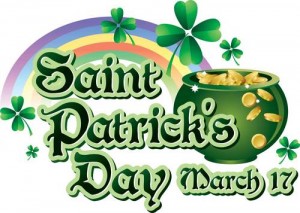- Two Thanksgiving Thoughts for the ACAPosted 11 years ago
- Shop til you Drop at the Healthcare Marketplace Part 2: Frustration!Posted 11 years ago
- An Early Casualty in the Affordable Care FightPosted 11 years ago
- Some Good News for a ChangePosted 11 years ago
The St. Patrick’s Day Parade Controversies in Boston and New York City
Here are a couple of articles on the topic if you’re not familiar with what’s going on:
St. Patrick’s Day parade talks continue, Lynch says http://www.bostonglobe.com/metro/2014/03/09/patrick-day-parade-talks-continue-lynch-says/N6MwlLU3MZQRWrc7SOQFGL/story.html
Mayor de Blasio breaks tradition, boycotts St. Patrick’s Day Parade over gay-pride ban http://www.nydailynews.com/news/politics/de-blasio-boycotts-st-patrick-day-parade-gay-pride-article-1.1602586
When you don’t put any thought into this issue, your immediate reaction (assuming you consider your thinking modern, tolerant, and politically correct) is that the organizers are bad people and should be put in their place.
A stipulation that was offered to the gay group that wants to march in the NYC parade is that they could take part in the proceedings as long as they don’t identify themselves by their sexual orientation. I don’t find that unfair at all. As far as I know, the parades are not sex-themed and no other groups in the parade march under a banner of sexuality. I guess you could argue that they all march under the “heterosexual” banner by default but they otherwise don’t make any direct statement about sexuality. I also suppose it’s a given that mainstream culture is inherently designated “heterosexual” and that stores, bars, and restaurants are likewise straight by default.
I’ve long felt that sexuality of any kind is a questionable basis for a community, cause, or lifestyle. Outside of the private interaction between consenting adults, it should be a non-issue, which would make a lot of sense if our culture wasn’t as obsessed with sex as we are. All you need to do to see evidence of that is watch movies and TV and pay attention to advertising.
I guess the biggest reason for St. Patrick’s Day participants to identify themselves as being gay (or LGBT) is that it’s necessary to take every possible opportunity to show young gay people that they are not alone and to let society in general know gay people exist in the hopes that it becomes accepted to the point it becomes a non-issue and no longer matters. On the way, however, there have to be bumps to contend with and some of the ways gays present themselves publicly can be pretty off-putting. I went to several San Francisco Gay Pride Parades in the 1980’s and, while most of the floats were fun and entertaining, I was shocked and grossed out by the topless “Dykes on Bikes” and the male full frontal nudity exhibited on some of the floats. Those displays are extreme and two steps back in furthering the cause of a wider acceptance of gays.
Then you come across stories like these recent articles:
http://www.nydailynews.com/news/national/frozen-indoctrinating-kids-gay-pastor-article-1.1717492
http://www.boston.com/lifestyle/blogs/bostonspirit/2014/03/lesbian_couple_files_suit_agai.html
Gays should use every forum within reason they can get access to in order to further the cause of acceptance of diversity but I’m not sure the St. Patrick’s Day parades are appropriate. Even if they avoid the words “gay” or “homosexual” for their groups and use instead something like “diversity”, sexuality is still implied.
A big roadblock to a wider acceptance of gays, as with a lot of social issues (like medicinal marijuana), is that the people who need to open themselves to learning more so they can shake off their hateful ignorance are the last ones to do it. Some people are just in their comfort zone by validating themselves by what they hate (a defining traits of Nazis, the KKK, serial killers, mass murderers, religious fundamentalists, ultra-conservative Republicans) and there’s no getting through to them, which is something the rest of us apparently need to accept.
Daniel Patrick Walker
March 16, 2013
After posting my article I came across this one, which may or may not be related in theme:
http://www.salon.com/2014/03/15/how_did_irish_americans_get_so_disgusting/





My question would be a simple one. How are the other floats in the parade presented? The same rules should apply. If they display their organizations’ names, then that is what should be displayed on a GLBT organization’s float. I imagine that St. Patrick’s Day/Irish (Green Pride) would be the theme on all floats including any float sponsored by a GLBT organization. To add any political theme to any float would corrupt the purpose of the parade.
Thanks, Bruce. Nice and succinct. Maybe you should write my articles.
In an uncomplicated world, the parade organizers could have simply stated that there was no need for a participating group or float to be designated as “Gay/LGBT”, since many of the groups had gay participants (which they likely did, out or not). The complications arise when someone asks for proof. Maybe we could then give each gay participant some sort of symbol to wear, like a pink triangle, to designate they are gay for the purposes of pacifying the doubters. Oh wait, that symbol’s already been taken.
What’s come out of Guinness, Sam Adams, and Heineken pulling out of the parade is that we now know they are gay-friendly companies. We also know the mayors of both cities are likewise supportive of gays. Those are positive outcomes. Neither of the two main elements come out of the controversies looking good. The groups that want to march under the banner of homosexuality/LGBT come across as demanding special treatment and the organizers come out looking like bigots. The latter look bad despite simply wanting to continue centuries-old traditions of celebrating St. Patrick which, unfortunately, became secondary in the wake of the controversies.
It all just shows how complicated the issue of universal acceptance/tolerance of gays is. I’ll stop here or I’ll be typing enough for an entirely new (and longer, which no one wants) article.
DPW
March 21, 2014
Good read, thanks Dan!